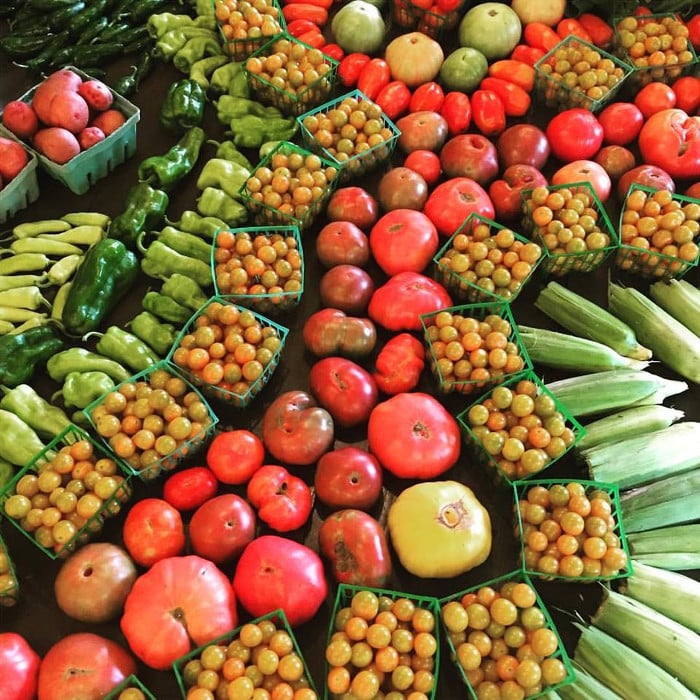
Fresh produce from East Austin’s Springdale Farm (Credit: Springdale Farm Facebook)
The topic of food access is a personal one for me, being from the small city of Pueblo, Colo., where half the population is Hispanic and 32 percent lives below the poverty line. Growing up, I consumed a diet heavily based on fast food, sodas, canned vegetables and packaged foods. I had never heard the word “organic” until my sophomore year of college in Boulder, Colo., when I stepped foot into a Whole Foods for the first time.
It was then that I began to question where my food came from and discovered my interest in nutrition. I now know I grew up in what the Department of Agriculture refers to as a “food desert:” an urban area in which it is difficult to buy affordable or good-quality fresh food.
“Food desert” seems to be a commonly used term nowadays. But beyond the deserts are food swamps, and neither are beneficial to a community’s health. Hilda Gutiérrez, Food Access Manager of the Sustainable Food Center (SFC), informed me that food swamps tend to be of more concern within the city of Austin, particularly in East Austin.
Food swamps are areas saturated with unhealthy food options offered by large corporations that target low-income communities of color. Not coincidentally, this is the population most affected by diet-related, preventable illness, such as type 2 diabetes and obesity. Fast food is cheap food. For families struggling to put meals on the table, the road leading to the drive-thru is often well-traveled.
Improving Access and Affordability
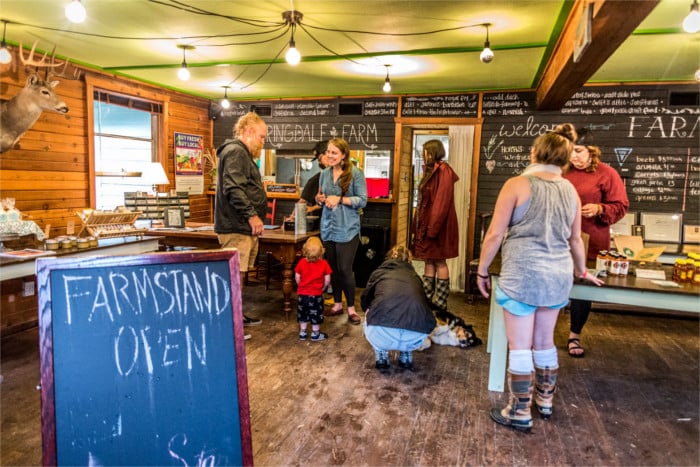
Springdale Farm’s farmstand (Credit: sandra ramos photography)
We are fortunate to live in a city with a vibrant local food community. SFC has been partnering with local farmers to make nutritious food more affordable through their Double Dollars Program, which allows those who receive SNAP (Supplemental Nutrition Assistance Program, formerly known as food stamps) benefits to double their dollars when buying fruits and vegetables at participating farmers’ markets.
In addition to the Double Dollars program being offered at all SFC Farmers’ Markets, in February 2016, Springdale Farm began participating in the program and is the first urban farm in Austin to do so.
As exciting as this is, Double Dollars sales at Springdale have been lackluster. Gutiérrez believes Springdale has a lot more potential for Double Dollars sales because of their East Austin location. She stated that, “Although the area surrounding Springdale is rapidly gentrifying, there are still a large number of residents who are either enrolled in or qualify for SNAP that could benefit from having a participating Double Dollars market in their neighborhood.”
Urban Farming: The Wave of the Future
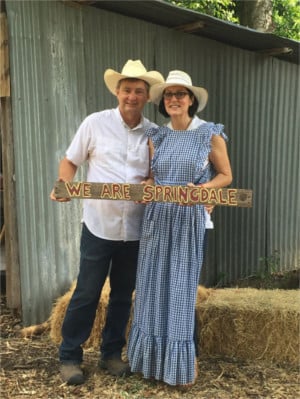
Glenn and Paula Foore, owners and founders of Springdale Farm (Credit: sandra ramos photography)
For those not familiar with Springdale Farm, it is a five-acre oasis situated just three miles from the State Capitol building. Glenn and Paula Foore began farming on the land in 2009, and today Springdale offers more than 75 organic, seasonal vegetable varieties.
It is no exaggeration to say that places like Springdale are the key to restoring our health and the health of our environment. Lack of access to local, organic food has increased due to the rapid urbanization of America. With over 80% of the U.S. population now living in urban areas, urban farming has become the wave of the future.
Challenges Facing Urban Farms
Even though urban farms may be the answer to urbanites having access to the most nutritious food possible, that doesn’t mean they don’t face challenges when it comes to economic viability.
Gutiérrez explains, “When we’re talking about food access, and affordability in particular, it’s challenging to get farmers to buy into that mission. Though they’re supportive of these efforts, they are also concerned about their bottom line. We have to think about how we can support local farmers to be able to participate in these programs and still have it be something that makes sense financially.”
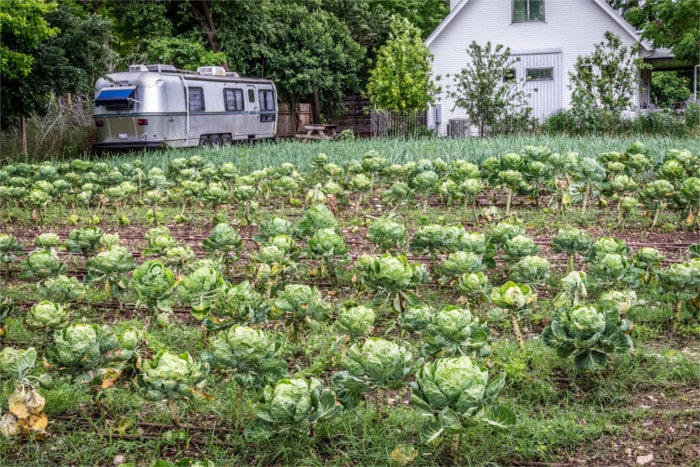
Growing crops on Springdale Farm (Credit: sandra ramos photography)
Most urban farms are unable to sustain themselves solely on produce sales and have to come up with ways to supplement their income because they do not receive the same government subsidies provided to larger, industrial farms. The Foores are all too familiar with this struggle—hosting events on the farm allows them to continue farming.
We can all support our local farmers by shopping at their markets. Springdale’s bi-weekly market, located at 755 Springdale Road, is open to the public on Wednesdays and Saturdays from 9 a.m.-1 p.m.
Resources/Getting Involved
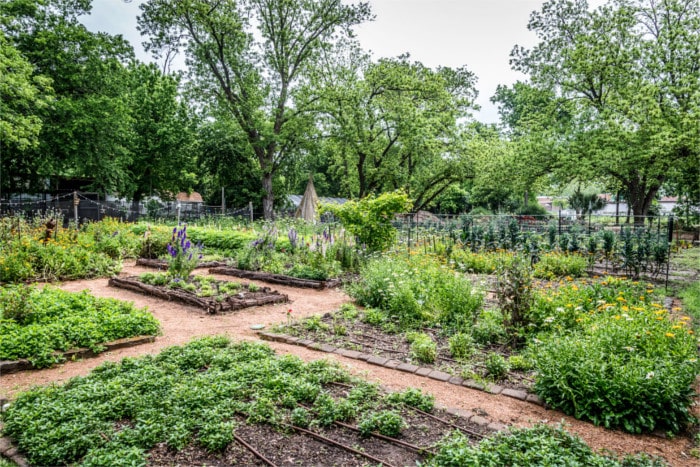
Springdale Farm in East Austin (Credit: sandra ramos photography)
In an effort to get the word out about the Double Dollars Program, Springdale Farm is hosting an Open House on June 25, 2016, featuring free fun for Austin families and live music from Afro-Caribbean Soul Collective. The Central Texas Food Bank will be there to provide information about SNAP; Patricia’s Table will be offering children’s cooking classes; and the Austin Public Library will be on-site with their bookmobile.
Further resources:
- Find out if you qualify for SNAP benefits.
- Already receiving SNAP benefits? Find a Double Dollars market near you.
- Take advantage of the Sustainable Food Center programs.
- Sign up to volunteer at Springdale Farm.
@theAustinot wants to know:
Where do you obtain fresh produce in Austin?
- F-Stop Models How to Transform Lawn Into Urban Farm in Austin - October 25, 2017
- Everything’s Coming Up Roses for Woman-owned Business, Petals, Ink. - June 20, 2017
- Farmgrass Raises Emergency Medical Funds for Central Texas Farmers - June 6, 2017

I love this shout out for Springdale Farms (and I get that this article is intended as a look primarily at Springdale), but I couldn’t help noticing there’s no mention of Johnson’s Backyard Garden’s presence in this area. That CSA has long been partnered with Sustainable Food Center (I pick up my CSA box there at the Farmer’s Market every Tuesday). This urban farm is located in East Austin and has been servicing the population since 2004, when the owners started out of their East Austin backyard. And yes, they participate in the wonderful programs mentioned that help make quality food accessible to all. Here’s the link for more information: http://sustainablefoodcenter.org/programs/sfc-farmers-market/sfc-community-farm-stand-east
Just wanted to make sure that all the love is shared among the great folks working with the SFC to address this serious issue. Thanks Springdale Farms, Johnson’s Backyard Garden, and others who aren’t mentioned.